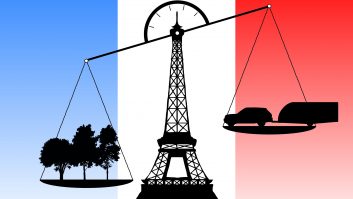It is no secret that British caravanners love hitching up and taking holidays in France – especially at this time of the year.
And even if France is not your final destination, many European touring holidays will involve some mileage in France.
So before you hit the road, make sure you are up to date with the latest rules and regulations, as the French authorities get hot on speeding and vehicle emissions.
Watch your speed
It’s as simple as this: there is zero leeway above the stated speed limit. And don’t be fooled if you no longer see radar speed-detection signs – many have been removed, but the checks are still there.
This means that the first inkling a driver has that he/she was clocked over the speed limit could be in conversation with the gendarmes at the next toll, miles from where the offence took place.
So if you have ever pushed on a bit when running late for the ferry or in eagerness to get pitched on site and dip your toes in the pool, give yourself more time and stay within the legal limits.
Indeed, the ‘Pelotons Motorisés‘ (mobile anti-speeding units) are targeting the autoroutes that feed the Channel ports, so beware – don’t say you weren’t warned!
If your tow car has a cruise control function, set it just below the limit to keep you legal without any worry. The French police will quote speeds in 1km/h increments, therefore it is wise to not drive precisely at the indicated limit, but a sliver under it, if you want to travel at the legal limit.
The cost of speeding
This is what you can expect to be fined if caught exceeding the speed limits in France.
In built-up areas:
- 1-39km/h over the 50km/h limit – €90 fine
When driving on autoroutes:
- 1-19km/h over the limit – €45 on-the-spot fine
- 20-39km/h over the limit – €90 on-the-spot fine
- 40-49km/h over the limit – €135 deposit + three-day disqualification [a court case will later be heard, where the deposit will be taken as a fine and the disqualification may be extended]
- In excess of 50km/h over the limit – €750 deposit, plus disqualification; vehicle impounded and forfeited [this will be followed by a court case and the fine may be increased to €1500, or €3000 if the driver has previous convictions]
Additional penalties may also be applied, so be in no doubt about how seriously speeding is being taken in France.
Low-emission zones
And there’s more! As we’ve said before, a system of ‘clean air’ stickers has been introduced.
At present, this only applies in Paris, Grenoble and Lyon, and if your car is not displaying the correct sticker – or vignette – you might have to pay a fine of at least €68.
The good news is that compliance is easy and cheap. Read our guide and buy your sticker online on the French government’s English-language website.
Each vignette lasts the lifetime of the vehicle (or, more accurately, the lifetime of the windscreen) – in order to prevent fraud, once applied the sticker can’t be removed without it tearing.
Of course, if you don’t plan to drive into a restricted city centre, there is nothing to worry about!
However, with more and more towns and cities looking to sign up to this scheme, it is well worth becoming acquainted with it if you wish to visit France.
There is zero leeway above the stated speed limit in France









